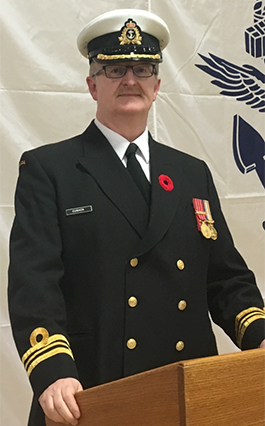Page Content
Memory is a powerful human faculty. The recollection of a past event may evoke a range of emotional responses. We might remember feeling excited for a graduation ceremony or nervous before taking the road test to get our license. Whatever the emotional response to a memory, we know that over time a memory can fade. Therefore, our annual act of remembrance is significant.

I can recall several occasions from my childhood of lining up along the main street of my hometown with my siblings and schoolmates for the annual Remembrance Day observance. Wearing poppies, which we received from members of the Legion, we would clap for the veterans and service personnel as they marched along the route to the local cenotaph. In the mid-1970s there were still many surviving soldiers, sailors and airforce members who had served our nation during the Second World War; there were even still many alive who had served in the Great War. While I may not have fully understood the significance of these men and women at the time, it was made abundantly clear by my parents and teachers that Remembrance Day was important; that we could never forget the price of peace. That concept stuck with me.
There are many images I can still recall about those Remembrance Day observances from my youth: the chill of an autumn morning, trees bereft of leaves, an array of colourful flags fluttering in the breeze, the trill of the bugle playing the “Last Post,” a reverent crowd observing silence for the fallen, the lament of bagpipes, the snap of a salute at the sound of “Reveille,” tears on the faces of those who had returned, still more tears for those who had not.
As a teen I was in scouts and was able to march in the annual parade. Following each year’s observance, I would take great interest in hearing the veterans’ stories and took great delight in thanking them for their service. I recall a certain naval vet who, in asking about the various badges on my uniform, said that one day I might choose to serve in the navy.
Upon joining the navy in 1985, I became profoundly aware of what being in service to one’s country means. I came to better understand why we are called to remember those who served in past conflicts and why we dedicate time to commemorate the sacrifice of those who died, those who returned, those on the home front. To this day I make a point of hearing the voices of those who served Canada in its time of need. I heed the refrain in the “Act of Remembrance” which, recited at the annual observance, states: We will remember them.
As a teacher, I know it is important to participate in school-based observances. When speaking at school assemblies and sharing my experiences as to why Remembrance Day is so important to Canadians, I strive to make meaningful connections to the importance of peacemaking, global citizenship and the need to serve the greater good of society.
I remind students of the challenge issued by John McCrae’s “In Flanders Fields,” that the torch is ours to hold high. That remembrance is a sacred national trust with those who laid down their lives that we may live and fully enjoy our many blessings. We must not, however, take such blessings for granted.
Today our world is volatile, uncertain, complex and often presents ambiguity that demands our students become critical thinkers who can solve problems, communicate, collaborate and find creative and innovative ways to persevere and overcome the challenges they will face. When I speak at school observances, I close by issuing the challenge for students to make remembrance something they do, not just think about. Acts of kindness, service and being a leader for peace can speak louder than words. Holding high the torch is our collective call to action as global citizens. Lest we forget.
As you read the “Act of Remembrance” please ask yourself, “How might I make remembrance something I do versus something I just think about?”
Act of Remembrance*
They shall grow not old,
as we that are left grow old;
Age shall not weary them,
nor the years condemn.
At the going down of the sun
and in the morning
We will remember them.
We will remember them. ❚
*An excerpt from “For the Fallen,” a poem by
Laurence Binyon
Tim Cusack is a teacher and administrator serving with Edmonton Catholic Schools and is an officer in the Royal Canadian Naval Reserve.
